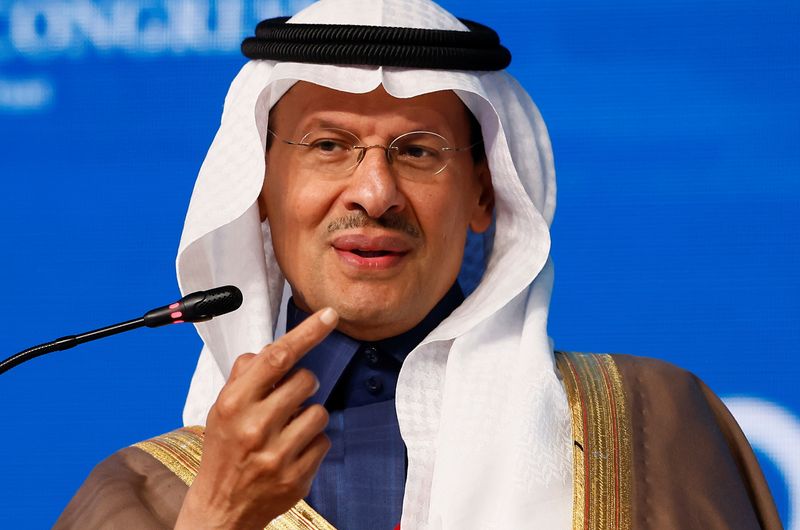Oil Climbs a Little as Saudis Issue Caution Over U.S. Reserves’ Release
2022.10.25 17:37
[ad_1]

© Reuters
By Barani Krishnan
Investing.com — Some say OPEC+ doesn’t like how the U.S. is influencing oil prices with its reserves. Others say members of the alliance are smirking at how the Biden administration is creating a bigger hole for America by draining down its emergency crude stockpiles when it might have a real emergency need later for those supplies.
Saudi Energy Minister Abdulaziz bin Salman’s message to the United States on Tuesday seemed to have a combination of both — mild annoyance and derision — as he cautioned about the pitfalls of using the Strategic Petroleum Reserve (SPR) to keep a lid on market prices of both crude and fuel.
“It is my profound duty to make clear to the world that losing (releasing) emergency stocks may be painful in the months to come,” the minister, sometimes referred to by his initials as AbS, said at an industry conference in Riyadh.
AbS’ remarks also came right after the head of the International Energy Agency said its members have oil reserves available to conduct another round of releases if needed.
“We still have [a] huge amount of stocks to be released in case we see supply disruptions,” Fatih Birol, the executive director of the Paris-based adviser, said in a group interview at the Singapore International Energy Week Conference. “Currently it is not on the agenda, but it can come anytime.”
Birol also said that tightening markets for liquefied worldwide and supply cuts by major oil producers have put the world in the middle of “the first truly global energy crisis.”
New York-traded settled up 74 cents, or 0.9%, at $85.32 a barrel, after falling 1.6% in two previous sessions.
London-traded settled up 26 cents, or 0.3%, at $93.52 per barrel. It fell as much in the previous session.
President Joe Biden announced the sale of an additional 15 million barrels from the SPR last week to follow through with some 180 million released from the reserve over the past six months by his administration.
The releases helped pull Brent down from a March high of almost $140 a barrel to the low $80s by September. The higher volumes of oil in the market also created additional supply to refineries, bringing down fuel prices that at one point hit record highs above $5 per gallon. On Tuesday, a gallon of gasoline at U.S. pumps averaged $3.85 a gallon.
The additional SPR release of 15 million barrels is expected to coincide with the 2 million barrels per day cut in global oil supply announced by OPEC+ for November onwards.
The cut announced by OPEC+ had initially triggered a sharp rally in crude prices, bringing Brent back near $100, from an eight-month low of under $83. OPEC+ is led by Saudi Arabia, with Russia as its biggest ally. OPEC+ has been trying to play down the impact of its cuts on the burden of consuming countries, with AbS saying on Tuesday that Saudi sales to Europe stood at 950,000 barrels in September from 490,000 barrels the same time a year ago.
Biden, meanwhile, is trying to ensure that the upcoming OPEC+ production cut does not push fuel prices up before the November 8 U.S. midterm elections. The president has, however, taken heat from his Republican rivals over the use of the SPR, which has pushed the reserve’s stockpile to just around 400 million barrels — its lowest in 35 years.
The Saudis have had a trying relationship with the U.S. since Biden took office despite the two nations being long-time strategic allies on energy and security. U.S. relations with both Russia and Saudi Arabia have hit their lowest in decades as Biden approved sanctions against Moscow over the Ukraine conflict while accusing Riyadh of supporting the invasion by the Kremlin.
Biden has said there will be “consequences” for the Saudi action while AbS sought to take the higher moral ground in the dispute on Tuesday, claiming the kingdom had been “the maturer” side in the spat.
[ad_2]
Source link







